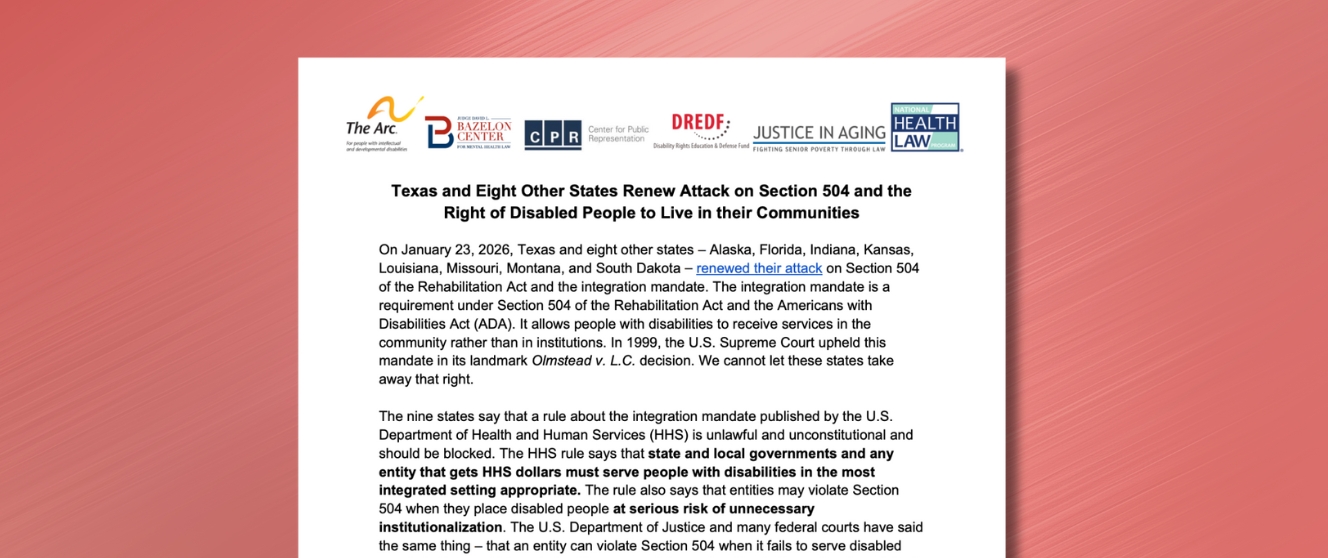
The Honorable Kathleen Sebelius
Secretary of Health and Human Services
U.S. Department of Health and Human Services
200 Independence Avenue, SW
Washington, DC 20201
SUBJECT: Proposed Data Collection Standards for Race, Ethnicity, Primary Language, Sex, and Disability Status Required by Section 4302 of the Affordable Care Act
Docket ID Number: HHS-OMH 2011–0013
Dear Secretary Sebelius:
Thank you for the opportunity to comment on the Department of Health and Human Service (HHS) Notice of Proposed Rulemaking (NPRM) concerning the requirement set forth in Section 4302 of the Affordable Care Act (ACA) mandating the collection of data on “disability status for applicants, recipients, or participants” by “any federally conducted or supported health care or public health program, activity or survey.” The Disability Rights Education and Defense Fund (DREDF) is a leading national law and policy center that advances the civil and human rights of people with disabilities through legal advocacy, training, education, and public policy and legislative development.
We strongly support the proposal to use a standard set of questions on disability that span all federal surveys that gather demographic data. This is a significant step in strengthening the capacity for comparison between findings of different survey instruments. The six questions in the 2011 American Community Survey (ACS) that the NPRM proposes adopting have been rigorously tested and evaluated and provide a strong basis for moving forward. Moreover, we also support requiring that the same standard set of questions be used by federally conducted or supported health care or public health programs or activities in order to collect data on disability status for applicants, recipients, or participants, as required by Section 4302 of the ACA.
However, we only support the use of these questions as a starting point. The current ACS six questions do not accurately identify some people with limitations associated with, for example, certain mental health, speech, developmental or learning impairments as well as some people with limitations associated with certain types of neurological impairments.
The National Health Interview Survey (NHIS) is widely regarded as an effective tool for acquiring information about health status that also includes information about functional limitations of respondents. A recent, unpublished analysis that tested the proportion of NHIS respondents with activity limitations who were classified by the 2010 ACS disability questions as having a disability, by cause of activity limitation, suggest the following strengths and limitations of the ACS:[1]
- People limited in activity by more severe cognitive disabilities (Alzheimer’s, Intellectual Disability) or by sensory disabilities are very likely to be captured by the ACS measure.
- People limited in activity by speech impairments alone or by learning disabilities are very unlikely to be captured.
- People limited in activity by developmental disabilities other than intellectual disability (ID), and people limited in activity by various chronic health conditions, are only moderately likely to be captured by the ACS measure.
- People limited in activity by mental health conditions, in general, are likely to be captured (but it is not possible to determine whether people with more serious and less prevalent mental health conditions are well captured).
- Only about two-thirds of people limited in activity by epilepsy, Multiple Sclerosis, Muscular Dystrophy, paralysis due to other disorders, and other nervous system conditions are captured by the ACS measure.
In light of this preliminary information, we strongly recommend that HHS commit to develop additional questions within a specific timeframe that will increase its capacity to identify people with activity limitations that may be underrepresented by the current ACS related to, for example, mental health, learning, developmental, speech and neurological impairments and that these questions be added to the standard 6 for use in identifying disability status. These questions can be built upon experience with such questions in the NHIS and other health surveys and on the work of the Washington Group on Disability Statistics.[2] The National Center for Health Statistics in collaboration with the Interagency Commission on Disability Research (ICDR) and the Census Bureau should be tasked with the responsibility of developing at least three additional questions that will measure more accurately the number of people whose activities are limited by impairments that are not captured by the current ACS questions. These additional questions are necessary because otherwise persons who experience health disparities and healthcare access barriers associated with their functional limitations are likely to be missed.
Moreover, we also call on HHS to require that the same standard (the ACA six-plus) set of questions be used by federally conducted or supported health care or public health programs or activities to collect data on disability status for applicants, recipients, or participants, as required by Section 4302 of the ACA.
We strongly urge HHS to require that the same activity limitation questions (the ACA six-plus) be used by federally conducted or supported health plans at the point of enrollment of beneficiaries. Where needed, a proxy (e.g. a parent or adult child) may answer these questions. Moreover, with the incorporation of electronic medical records, we estimate that it will be feasible to incorporate the functional limitation questions into the record, completed by the patient (or proxy) as a part of the assessment information routinely collected when patients appear for care. Beyond pure data collection, this measure identifies people with specific risks of encountering barriers to health care and health service, and will give providers information that can assist them to improve the quality of care afforded to people with disabilities.
In addition to calling for collection of data on disability status for applicants, recipients, or participants by any federally conducted or supported health care or public health program, activity or survey, Section 4302 of the ACA also requires the collection of additional information related to specific, known barriers to healthcare that affect individuals with disabilities and that contribute to the health and health care disparities they experience, and sets forth the following specific data collection standards:
“[S]urvey health care providers and establish other procedures in order to assess access to care and treatment for individuals with disabilities and to identify—
“(i) locations where individuals with disabilities access primary, acute (including intensive), and long- term care;
“(ii) the number of providers with accessible facilities and equipment to meet the needs of the individuals with disabilities, including medical diagnostic equipment that meets the minimum technical criteria
“(iii) the number of employees of health care providers trained in disability and patient care of individuals with disabilities.”
We are very surprised and concerned that HHS did not include a plan for collecting such data in its Notice of Proposed Rulemaking related to implementation of the Section 4302 requirements. We urge you therefore to establish a work group to identify existing and recommend additional mechanisms to collect this information, and to set a date by which those recommendations will be implemented. For specific suggestions regarding methods to identify and collect such information, we direct you to the letter submitted to Dr. Garth Graham, Deputy Assistant Secretary for Minority Health, David Meyers at AHRQ and Marsha D. Lillie-Blanton at CMS/CMCS on April 28, 2011 by the Leadership Conference on Civil Rights (LCCR). We also direct you to a similar letter submitted by the National Council on Disability (NCD).
Thank you for your consideration.
Sincerely,
Susan R. Henderson
Executive Director
Endnotes
[1] Proportion of NHIS respondents with activity limitations who were classified by the ACS disability questions as having a disability, by cause of activity limitation, 2010.
| Cause of activity limitation | % captured by ACS measure |
|---|---|
| Alzheimer’s, senility | 90 |
| Intellectual disability (formerly MR) | 85 |
| Hearing | 80 |
| Vision | 78 |
| Stroke | 78 |
| Mental health | 70 |
| Aging-related condition, other/unspecified | 69 |
| Injury | 67 |
| Arthritis/rheumatism | 66 |
| Epilepsy, MS, MD, paralysis, other nervous system | 66 |
| Fibromyalgia, lupus, osteoporosis, other musculoskeletal/connective | 63 |
| Birth defect | 61 |
| Diabetes | 61 |
| Cancer, tumor, cyst | 60 |
| Heart condition | 57 |
| Developmental disability (other than ID, formerly MR) | 57 |
| Back/neck problem | 56 |
| Asthma, emphysema, other lung/breathing problem | 54 |
| Learning disability (ascertained for <18 only) | 26 |
| Speech impairment | 16 |
| Other | 44 |
| Any cause of activity limitation | 67 |
Note: Denominator is NHIS respondents ages 5+ who were identified as having activity limitations using the standard NHIS disability questions. A statistical model was used to control for the presence of multiple causes of disability; only statistically significant predictors were retained.
Source: H. Stephen Kaye, unpublished analysis of the disability question test from the 2010
National Health Interview Survey.
[2] The main purpose of the Washington Group on Disability Statistics is the promotion and coordination of international cooperation in the area of health statistics by focusing on disability measures suitable for censuses and national surveys, which will provide basic necessary information on disability throughout the world. Website: unstats.un.org/unsd/methods/citygroup/washington.htm

